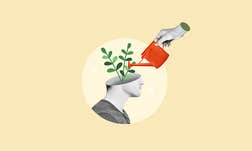Eugenia Cheng, mathematician and author of Is Math Real: How Simple Questions Lead Us to Mathematics’ Deepest Truths, on the power of math, as told to Elizabeth Landau.
Stupid Questions
A few years ago, a high school girl did a TikTok asking a lot of questions about math, like how do we know it’s right. There was a big social media pile-on. A lot of people called her the dumbest person ever. But I wrote a reply to each of her questions that just took off, and then a series of radio interviews. Loads of people wrote to me from around the world telling me they were so moved that they cried, that they had to stop their cars by the side of the road. These were fully grown men telling me they never felt validated about all those questions they’d wanted to ask. They’d spent their whole lives accepting that they were stupid in this way. That’s why I wrote this book, Is Math Real?: How Simple Questions Lead Us to Mathematics’ Deepest Truths. There really are no stupid questions in math. If something is genuinely baffling you, that’s a good sign. Research mathematicians feel confused all the time and use that as an urge to keep asking questions rather than to run away.
We Are All Math People
Humans have a very strong propensity for spotting patterns. It’s something we have done across all cultures and civilizations because we want to understand what’s going on around us. On the internet, people will say, “Oh, if you call that math, then everyone’s doing math.” As if that’s a bad thing. But I’m like, “Yeah, everyone is doing math.” That doesn’t mean that you’re doing mental arithmetic and trigonometry all the time. But discovering connections and patterns, which is at the core of math, is a deeply human urge.
Humans have a very strong propensity for spotting patterns.
Is Math Real?
Sometimes people think math is just made up. And they say that to denigrate it. But what does real even mean? And if it’s not real, so what? Fiction and feature films are not real stories, but they still teach us things about our lives. Some of the power of math lies in the very fact that it’s made up. It’s in our imagination, and so it has fewer constraints.
The Power of Play
I don’t know if we can get rid of standardized testing, because people are so invested in it. But I think the idea that we have to teach certain content to students, such as timetables, is really harmful, because we don’t pay enough attention to how they feel about it. I’ve seen the consequences of that with the art students I teach math to at the School of the Art Institute of Chicago. They deliberately forget it as fast as possible when they leave school and might even run away from math for the rest of their lives.
In kindergarten, there’s typically a very playful approach to math. It’s not serious. You count with blocks, you play with objects. When I’ve helped with math in kindergarten, the children scream with excitement. The fear hasn’t set in yet. But in the higher grades, they have to answer questions correctly, and get told how good they are. By the time students get to college, they’re horrified. Of course, if you make it all the way through school, and go to grad school for math, and you start your research, you get to play around again. I wish we could maintain play all the way through and let children discover things for themselves. ![]()
Lead photo by Brian McConkey




























